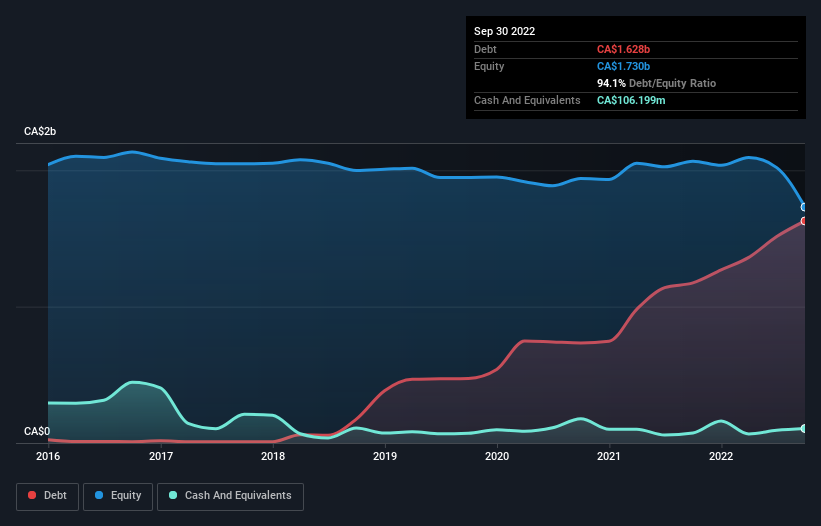David Iben put it well when he said, 'Volatility is not a risk we care about. What we care about is avoiding the permanent loss of capital.' So it might be obvious that you need to consider debt, when you think about how risky any given stock is, because too much debt can sink a company. Importantly, Maple Leaf Foods Inc. (TSE:MFI) does carry debt. But should shareholders be worried about its use of debt?
What Risk Does Debt Bring?
Debt and other liabilities become risky for a business when it cannot easily fulfill those obligations, either with free cash flow or by raising capital at an attractive price. If things get really bad, the lenders can take control of the business. However, a more usual (but still expensive) situation is where a company must dilute shareholders at a cheap share price simply to get debt under control. Of course, the upside of debt is that it often represents cheap capital, especially when it replaces dilution in a company with the ability to reinvest at high rates of return. When we examine debt levels, we first consider both cash and debt levels, together.
Our analysis indicates that MFI is potentially undervalued!
What Is Maple Leaf Foods's Debt?
As you can see below, at the end of September 2022, Maple Leaf Foods had CA$1.63b of debt, up from CA$1.17b a year ago. Click the image for more detail. On the flip side, it has CA$106.2m in cash leading to net debt of about CA$1.52b.

A Look At Maple Leaf Foods' Liabilities
Zooming in on the latest balance sheet data, we can see that Maple Leaf Foods had liabilities of CA$680.4m due within 12 months and liabilities of CA$2.03b due beyond that. Offsetting this, it had CA$106.2m in cash and CA$260.6m in receivables that were due within 12 months. So its liabilities total CA$2.35b more than the combination of its cash and short-term receivables.
This is a mountain of leverage relative to its market capitalization of CA$3.09b. This suggests shareholders would be heavily diluted if the company needed to shore up its balance sheet in a hurry. There's no doubt that we learn most about debt from the balance sheet. But it is future earnings, more than anything, that will determine Maple Leaf Foods's ability to maintain a healthy balance sheet going forward. So if you're focused on the future you can check out this free report showing analyst profit forecasts.
Over 12 months, Maple Leaf Foods reported revenue of CA$4.7b, which is a gain of 3.2%, although it did not report any earnings before interest and tax. We usually like to see faster growth from unprofitable companies, but each to their own.
Caveat Emptor
Over the last twelve months Maple Leaf Foods produced an earnings before interest and tax (EBIT) loss. Indeed, it lost CA$6.4m at the EBIT level. When we look at that and recall the liabilities on its balance sheet, relative to cash, it seems unwise to us for the company to have any debt. So we think its balance sheet is a little strained, though not beyond repair. Another cause for caution is that is bled CA$227m in negative free cash flow over the last twelve months. So in short it's a really risky stock. When analysing debt levels, the balance sheet is the obvious place to start. But ultimately, every company can contain risks that exist outside of the balance sheet. To that end, you should be aware of the 2 warning signs we've spotted with Maple Leaf Foods .
When all is said and done, sometimes its easier to focus on companies that don't even need debt. Readers can access a list of growth stocks with zero net debt 100% free, right now.
New: Manage All Your Stock Portfolios in One Place
We've created the ultimate portfolio companion for stock investors, and it's free.
• Connect an unlimited number of Portfolios and see your total in one currency
• Be alerted to new Warning Signs or Risks via email or mobile
• Track the Fair Value of your stocks
Have feedback on this article? Concerned about the content? Get in touch with us directly. Alternatively, email editorial-team (at) simplywallst.com.
This article by Simply Wall St is general in nature. We provide commentary based on historical data and analyst forecasts only using an unbiased methodology and our articles are not intended to be financial advice. It does not constitute a recommendation to buy or sell any stock, and does not take account of your objectives, or your financial situation. We aim to bring you long-term focused analysis driven by fundamental data. Note that our analysis may not factor in the latest price-sensitive company announcements or qualitative material. Simply Wall St has no position in any stocks mentioned.
About TSX:MFI
Maple Leaf Foods
Produces food products in Canada, the United States, Japan, China, and internationally.
Established dividend payer with proven track record.
Similar Companies
Market Insights
Community Narratives



